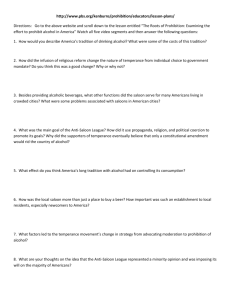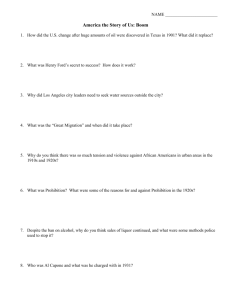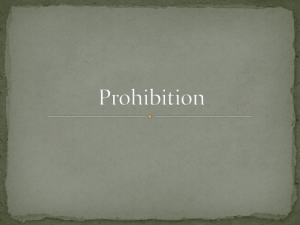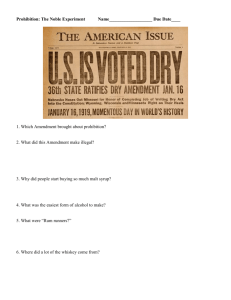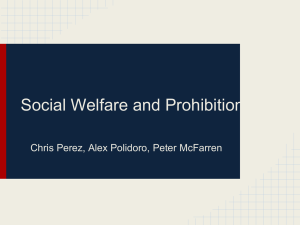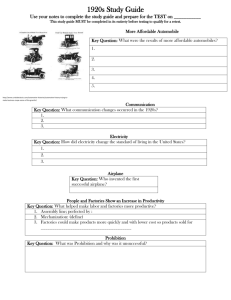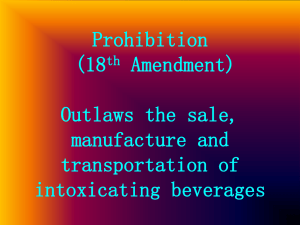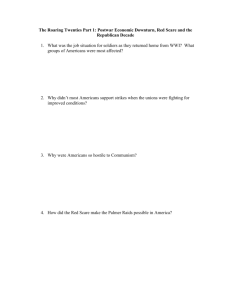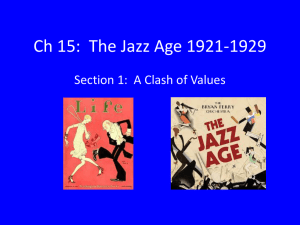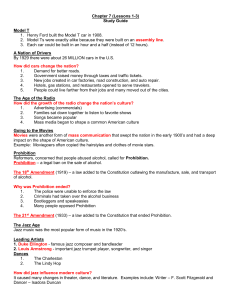Prohibition- The Noble Experiment
advertisement
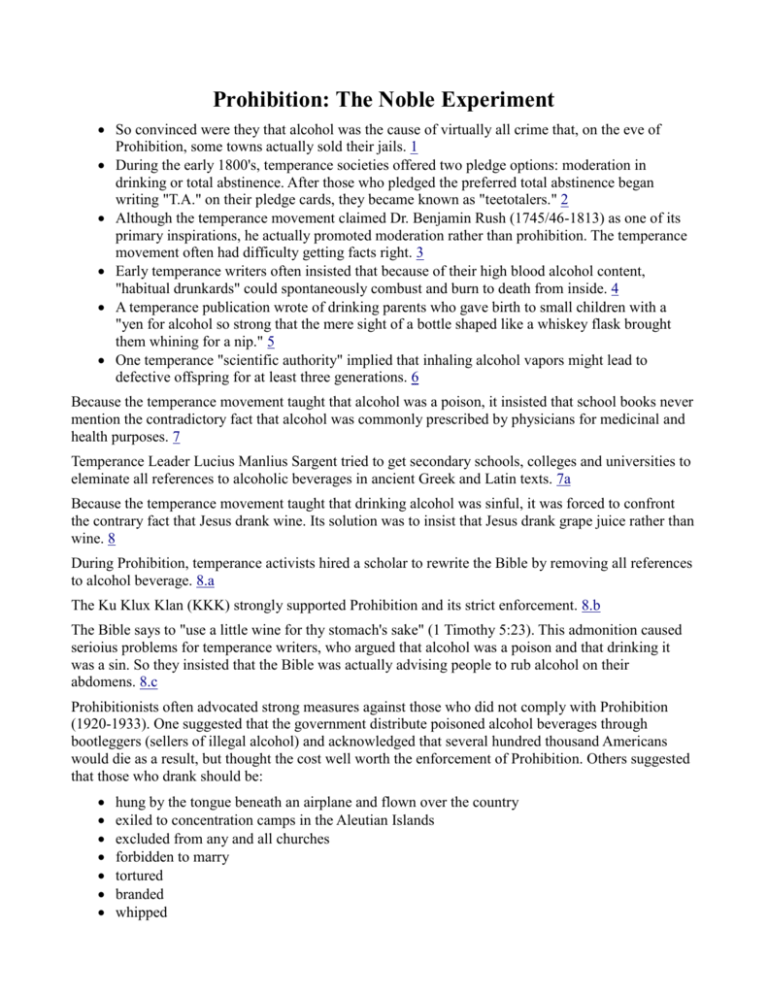
Prohibition: The Noble Experiment So convinced were they that alcohol was the cause of virtually all crime that, on the eve of Prohibition, some towns actually sold their jails. 1 During the early 1800's, temperance societies offered two pledge options: moderation in drinking or total abstinence. After those who pledged the preferred total abstinence began writing "T.A." on their pledge cards, they became known as "teetotalers." 2 Although the temperance movement claimed Dr. Benjamin Rush (1745/46-1813) as one of its primary inspirations, he actually promoted moderation rather than prohibition. The temperance movement often had difficulty getting facts right. 3 Early temperance writers often insisted that because of their high blood alcohol content, "habitual drunkards" could spontaneously combust and burn to death from inside. 4 A temperance publication wrote of drinking parents who gave birth to small children with a "yen for alcohol so strong that the mere sight of a bottle shaped like a whiskey flask brought them whining for a nip." 5 One temperance "scientific authority" implied that inhaling alcohol vapors might lead to defective offspring for at least three generations. 6 Because the temperance movement taught that alcohol was a poison, it insisted that school books never mention the contradictory fact that alcohol was commonly prescribed by physicians for medicinal and health purposes. 7 Temperance Leader Lucius Manlius Sargent tried to get secondary schools, colleges and universities to eleminate all references to alcoholic beverages in ancient Greek and Latin texts. 7a Because the temperance movement taught that drinking alcohol was sinful, it was forced to confront the contrary fact that Jesus drank wine. Its solution was to insist that Jesus drank grape juice rather than wine. 8 During Prohibition, temperance activists hired a scholar to rewrite the Bible by removing all references to alcohol beverage. 8.a The Ku Klux Klan (KKK) strongly supported Prohibition and its strict enforcement. 8.b The Bible says to "use a little wine for thy stomach's sake" (1 Timothy 5:23). This admonition caused serioius problems for temperance writers, who argued that alcohol was a poison and that drinking it was a sin. So they insisted that the Bible was actually advising people to rub alcohol on their abdomens. 8.c Prohibitionists often advocated strong measures against those who did not comply with Prohibition (1920-1933). One suggested that the government distribute poisoned alcohol beverages through bootleggers (sellers of illegal alcohol) and acknowledged that several hundred thousand Americans would die as a result, but thought the cost well worth the enforcement of Prohibition. Others suggested that those who drank should be: hung by the tongue beneath an airplane and flown over the country exiled to concentration camps in the Aleutian Islands excluded from any and all churches forbidden to marry tortured branded whipped sterilized tattooed placed in bottle-shaped cages in public squares forced to swallow two ounces of caster oil executed, as well as their progeny to the fourth generation. 9 The Real McCoy Bill McCoy was a bootlegger well known for selling quality imported goods: the original "real McCoy." 10 The Speakeasy "Bathtub gin" got its name from the fact that alcohol, glycerine and juniper juice was mixed in bottles or jugs too tall to be filled with water from a sink tap so they were commonly filled under a bathtub tap. 17 The speakeasy got its name because one had to whisper a code word or name through a slot in a locked door to gain admittance. 18 Prohibition led to widespread disrespect for law. New York City alone had about thirty thousand (yes, 30,000) speakeasies. And even public leaders flaunted their disregard for the law. They included the Speaker of the United States House of Representatives, who owned and operated an illegal still. 19 Some desperate and unfortunate people during Prohibition falsely believed that the undrinkable alcohol in antifreeze could be made safe and drinkable by filtering it through a loaf of bread. It couldn't and many were seriously injured or killed as a result. 20 In Los Angeles, a jury that had heard a bootlegging case was itself put on trial after it drank the evidence. The jurors argued in their defense that they had simply been sampling the evidence to determine whether or not it contained alcohol, which they determined it did. However, because they consumed the evidence, the defendant charged with bootlegging had to be acquitted. 21 When the ship, Washington, was launched, a bottle of water rather than Champagne, was ceremoniously broken across its bow. 22 National Prohibition not only failed to prevent the consumption of alcohol, but led to the extensive production of dangerous unregulated and untaxed alcohol, the development of organized crime, increased violence, and massive political corruption. Amazingly, some people today insist that Prohibition was a success! 23 Although Prohibition was repealed seven decades ago, there are still hundreds of dry counties across the United States today. 24 The human body produces its own supply of alcohol naturally on a continous basis, 24 hours a day, seven days a week. Therefore, we always have alcohol in our bodies. . . and no one waits until the age of 21 before producing this alcohol. 25 Prohibition clearly benefited some people. Notorious bootlegger Al Capone made $60,000,000...that's sixty million dollars...per year (untaxed!) while the average industrial worker earned less than $1,000 per year. 27 But not everyone benefitted. By the time Prohibition was repealed, nearly 800 gangsters in the City of Chicago alone had been killed in bootleg-related shootings. And, of course, thousands of citizens were killed, blinded, or paralyzed as a result of drinking contaminated bootleg alcohol. 28 The “Father of Prohibition,” Congressman Andrew J. Volstead, was defeated shortly after Prohibition was imposed. 30 Repeal occurred at 4:31 p.m. on December 5, 1933, ending 13 years, 10 months, 19 days, 17 hours and 32.5 minutes of Prohibition. "What America needs now is a drink" declared President Franklin D. Roosevelt at the end of Prohibition. 31 Prohibitionists didn't give up easily. They even tried to enforce Prohibition for as long as ten years after its repeal by the Twenty-first Amendment. 29 1. List two examples of misinformation that temperance (people who don't drink alcohol) writers told the public. __________________________________________________________________ __________________________________________________________________ 2. List one negative effect of Prohibition. __________________________________________________________________ __________________________________________________________________ 3. The 18th Ammendment was repealed, and Prohibition did not succeed as a law. What do you think would have to happen differently for it to succeed? __________________________________________________________________ __________________________________________________________________ __________________________________________________________________ 4. How are God's commandments different from our government's laws? __________________________________________________________________ __________________________________________________________________ 5. Do you think that we should have laws to hold us to a moral standard? Explain. __________________________________________________________________ __________________________________________________________________ __________________________________________________________________
